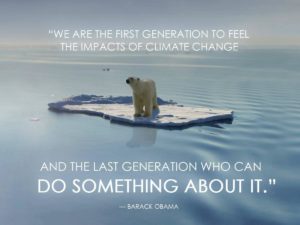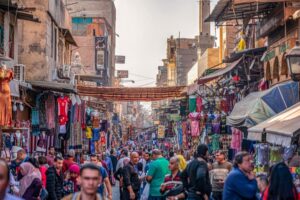One of the most beautiful islands located in the central Pacific Ocean, Kiribati (or Kiribass) is a country housing approximately 116,398 residents (as of 2017). The country’s pristine beaches and engaging activities such as scuba diving, lagoon surfing, and flyfishing draw many tourists to visit its shores annually. But in recent years, this beautiful paradise has begun to sink. According to the New York Times, one such instance occurred on Tarawa, a city in Kiribati: “One clear bright day last winter, a tidal surge swept over an ocean embankment here in the remote, low-lying island country of Kiribati, smashing through the doors and windows of Betio Hospital and spewing sand and debris across its maternity ward.”
But how is this happening?
It’s because of climate change.
Due to climate change and sea levels rising, extremely shallow islands like Kiribati are facing daily floods and experiencing the destruction of their homes and businesses. The highest point on many of Kiribati’s islands is merely a couple of meters above sea level — it won’t take that long for the sea level to rise even further up above.
For years, scientists have been predicting of Kiribati’s demise due to climate change and have tried to acknowledge this fact to its residents, who, unfortunately, didn’t pay heed to it. Now, after experiencing a king tide and other constant challenges, such as a lack of freshwater, the destruction of crop-growing lands and the displacement of its residents; the people of Kiribati have realized that the horrors of climate change are indeed true. The Guardian shared snippets from an interview of Claire Anterea, a social worker from the Kiribati Climate Action Network, in which she expressed her fear of the “extraordinary impact on our islands” and having witnessed the effects of rising sea levels on crop production in her country, she said: “It has just moved me into tears. Like, oh my God, this is very serious. [The sea] is two or three meters from the babai pit [where taro plants, a cash crop in Kiribati, are grown]. I feel hopeless in one way that our people are suffering, but I also have the hope within our people that they will try to find a way to adapt.”
Recent climate models predict that the world’s oceans will continue to rise approximately 5 to 6 feet more by the year 2100. That’s enough water to wash away entire villages on Kiribati; according to a World Bank study, “half of the 6,500-person village of Bikenibeu [a village in Kiribati], for instance, could be inundated by 2050 by sea-level rises and storm surges.” Keeping these statistics in mind, the government of Kiribati has been devising plans to relocate its people. Using a model called “migration with dignity,” this ideology urges residents to move abroad to another island nation after gaining employable skills. Other islands, such as the Fiji islands, contain portions of land that have been purchased by the Kiribati government in case they need to relocate their people. About 1,000 miles away, Fiji has a much higher elevation than Kiribati, making its land and shores more stable.

But taking these measures is not going to be easy; the government’s current actions go against many of Kiribati’s residents’ beliefs, who remain skeptical about the prospect of climate change washing away their country in the near future. Many of these skeptics are individuals in rural areas who are less educated on the matter and place their faith in more religious matters than scientific ones. Rikamati Naare, a news editor at Radio Kiribati, the state-run broadcaster, gave a statement about her fellow residents regarding this matter: “According to their biblical belief, we’re not going to sink because God is the only person who decides the fate of any country,” Due to rising contradictory beliefs among the public because of these reasons, the current president of Kiribati, Taneti Maamau, has shifted his work from climate change towards other priorities such as the health of residents, and education. He stated: “Climate change is a serious issue, but you can’t do very much about it, especially if a big hurricane comes.”
Regardless of these challenges, the people of Kiribati who understand the implications of climate change and the future of their country remain strong and hope that through relocation efforts, they will be able to migrate to a new country, such as the Fiji Islands, New Zealand or Australia [surrounding countries in the Pacific, which are accepting Kiribati residents]. Hopefully, through a joint effort and support, the beautiful nation of Kiribati will be able to save themselves from their country’s imminent drowning.
Watch the video below to see Kiribati’s story:
Sources:
AJ+, the organization credited for the video
https://www.nytimes.com/2016/07/03/world/asia/climate-change-kiribati.html




https://waterfallmagazine.com
I do consider all of the concepts you’ve offered in your post.
They are very convincing and will definitely work.
Still, the posts are too brief for newbies. May just you please extend them a
little from next time? Thank you for the post.